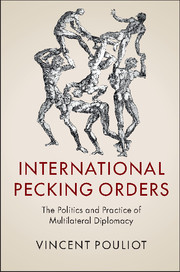Book contents
- Frontmatter
- Contents
- List of figures
- List of tables
- Preface and acknowledgments
- List of abbreviations
- Introduction: All the world's a stage
- Part I Situations
- Part II Dispositions
- Part III Relations
- Part IV Positions
- Conclusion: The “miracle” of multilateral pecking orders
- Appendix: Research design, methods and data
- References
- Index
Conclusion: The “miracle” of multilateral pecking orders
Published online by Cambridge University Press: 05 March 2016
- Frontmatter
- Contents
- List of figures
- List of tables
- Preface and acknowledgments
- List of abbreviations
- Introduction: All the world's a stage
- Part I Situations
- Part II Dispositions
- Part III Relations
- Part IV Positions
- Conclusion: The “miracle” of multilateral pecking orders
- Appendix: Research design, methods and data
- References
- Index
Summary
“What makes the world hang together?” asks Ruggie in one of his many insightful pieces. In a sense, what this book endeavored to do belongs to the same family of interrogations. In it I inquired into the various processes that go into making the social theater of world politics so prone to social stratification dynamics. What makes international pecking orders possible? Why is multilateral diplomacy so pervasively hierarchically ordered? In order to provide an answer to these questions, I went down to the “infinitely small” in the social world: patterns of established ways of doing things. I then worked my way up to understand how macro-phenomena such as international hierarchies come to emerge out of everyday, ordinary processes of diplomacy. To Ruggie's very deep question, then, my deceptively simple response is that practices are what make the world hang together.
Imagine for a moment that the social world is a bit like an onion – that it is comprised of several superimposed layers that more or less fit together. Mapping the shape of one particular layer will tell important things about the onion but certainly not everything that we need to know. Clearly, we need to peel off several layers in order to grasp the onion's full complexity. I would suggest that studying the structuring and structured effects of practices should be done in an analogous way, by delineating the multiple processes that make the world hang together. Drawing inspiration form Bourdieu, in this book I looked into four streams of social forces which, as they combine in and through practice, generate the opportunities and constraints that structure the diplomatic stage: situations, dispositions, relations and positions. These distinct social layers, which are related though irreducible to one another, coevolve and interact, a bit like the strings of a giant spider web. None could exist without the others, as they all rest upon one another. For that reason, looking for “the one” string that upholds the web – or analogously, the one social force that explains the world – seems futile. Capturing the totality of the web, by looking into how strings hang together, should be the analytical priority.
The main argument of this book is relatively straightfoward: International pecking orders are generated, reproduced and sometimes contested in and through the process of multilateral diplomacy.
- Type
- Chapter
- Information
- International Pecking OrdersThe Politics and Practice of Multilateral Diplomacy, pp. 254 - 271Publisher: Cambridge University PressPrint publication year: 2016



